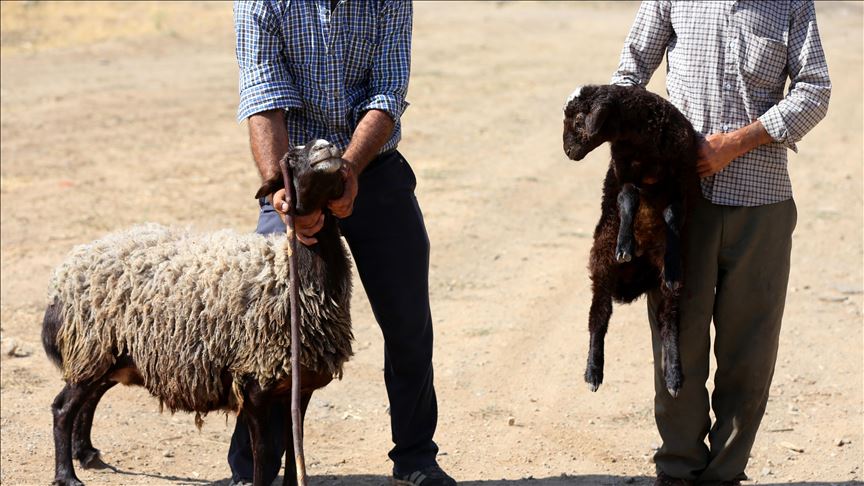New COVID-19 wave dampens eid festivities in Iran
For many, eid incomplete without animal sacrifice but ‘we have a bigger fight on our hands,’ Tehran resident tells Anadolu Agency
 file photo
file photo
TEHRAN
For Ali Reza, the excitement of waiting for Eid al-Adha festivities was always so palpable that his friends had coined a moniker for him: Qurbani, meaning “sacrifice” in the Persian language.
Since early childhood, the idea of offering animals as a sacrifice on Eid al-Adha, a feast based on the experience of Prophet Abraham, fascinated him.
The inquisitive teenager also enjoyed shopping and visiting his friends and family, an important fixture on the Islamic lunar calendar linked to this pillar of the Islamic faith.
This year, however, Reza can neither tag along with his father to buy cattle from the livestock market for sacrifice nor can he visit friends and relatives to offer customary eid greetings.
The outbreak of the COVID-19 pandemic has brought normal life to a grinding halt in almost all parts of the world, forcing Muslims to cancel or scale down celebrations.
In Iran, one of the first countries in the region to report cases of the virus in February, plans to observe the annual Muslim festival with traditional fanfare have been shelved.
President Hassan Rouhani urged people last week to exercise restraint in observing festivities in the wake of a new surge in infections, calling for full adherence to health protocols.
There has been an alarming spike in cases in recent weeks, dampening the festive spirit. The number of cases has reached 298,909 while the death toll jumped to 16,343.
Pandemic
The resurgence of the pandemic in Iran after a significant drop in infections in June created alarm, forcing authorities to reimpose stringent restrictions.
Wearing of masks and adherence to health protocols have been made mandatory after single-day deaths spiraled. All this has sullied the spirit of people ahead of the important festival.
“Eid al-Fitr, Eid al-Adha and Nowruz are the festivals we always look forward to,” Amin Sadheghi, a Tehran-based engineer, told Anadolu Agency. “But this pandemic has thrown life out of gear.”
Sadheghi, who moved out of his parents’ house in west Tehran following his marriage eight years ago, has always made it a point to spend all eids with his parents and siblings.
“But, this year things are different. Both my parents have had symptoms of the virus and required home quarantine,” he said. “Eid festivities can wait, we are praying for their full recovery.”
While celebrations for some have turned into gloom and distress due to patients at home or at the workplace, for others, restrictions imposed following the surge in new cases have stifled the mood.
“What is eid if we cannot shop for new clothes, take families out for lunch or dinner, visit mosque for prayers, offer animal sacrifice,” Mohammad Nazari, an entrepreneur from Mashhad, which was recently put in the high-risk “red category.”
For Reza, Eid al-Adha is incomplete without offering an animal sacrifice. “It somehow still does not sink that circumstances have forced us to abandon the most beautiful part of eid festivity,” he said. “It is sad indeed but at the moment we have a bigger fight on our hands.”
Authorities have banned the slaughter of livestock on eid as part of measures to contain the spread of virus.
The government designated certain places in Tehran where livestock can be purchased and also slaughter houses where the animals can be slaughtered with adherence to health protocols.
Economic problems
Eid al-Adha comes at a time when people in Iran are facing severe economic hardships. Crippling economic sanctions and the pandemic have dealt a double blow to the country’s fragile economy.
In recent weeks and months, Iran’s currency has sharply nosedived, consistently losing value against the dollar, resulting in exorbitant price spikes and simmering discontent.
“I rented a small apartment in central Tehran last year and this year the housing rent soared so much that I couldn’t afford it anymore,” according to Koroush Mohammadpur, a university student, who had to vacate his house one week before eid.
The price of essential commodities has also gone up in recent months, which experts say is partly due to US sanctions, the lockdown and closure of borders.
Rouhani last week tried to allay concerns regarding economic difficulties, saying the “great nation” of Iran will “not kneel” before its problems.
However, the lower-middle class is facing the heat. “This eid is perhaps the most difficult and different one as everything has become expensive, from vegetables to milk to rice to transport fare to internet,” said Kazimzadeh, a taxi driver from south Tehran.
Many people, he said, cannot even afford to buy a sheep to offer as sacrifice on eid. “Even buying essential items for home has become difficult with rising prices.”
While the general mood of despair and discontent, some are hopeful it shall pass.
“Sanctions have always been there and Iran has somehow learnt to minimize their impact,” said Mohammad Haneefi, a media practitioner and university lecturer. “Iran will bounce back strongly once the pandemic is over.”
Meanwhile, it remains to be seen how the pandemic will affect festivities and how festivities, if any, would contribute to the pandemic.
Anadolu Agency website contains only a portion of the news stories offered to subscribers in the AA News Broadcasting System (HAS), and in summarized form. Please contact us for subscription options.

